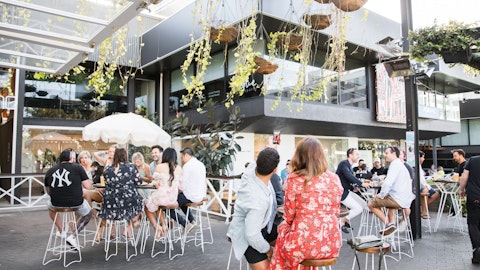Jeffrey Bernstein: Got it. And Rick, just to clarify, I think you mentioned before that you’ve seen relative stability in sales through the fiscal third quarter and even into March. Just from the outside looking, and I mean, with the most recent banking noise and things like that over the past few weeks. Does that lead to greater volatility day to day or week to week, or do you really not see it in the restaurant sales line, despite all the headlines that create so much noise for the broader macro?
Rick Cardenas: Well, Jeff, I think if you think about March, when you think, volatility will happen in March just because of shifts in spring break. So you have to take that into account. But trends are fairly consistent. So, when you think about a state might change where the spring break is. So, that will show volatility at restaurants. But in general, we feel like our trends haven’t really changed much.
Operator: Our next question comes from Josh Long with Stephens.
Josh Long: In terms of the context of relative visibility in your business, how are you thinking about the marketing and the messaging opportunity as we go into the back half of the year and then into fiscal ’24? I mean, still at kind of lower levels versus what we have seen on marketing spend basis versus prior years. Are you comfortable with that? Is there any reason to kind of adjust that strategy as we go into what could be a more challenging or potentially volatile macroeconomic environment?
Rick Cardenas: Hey Josh, this is Rick. We’re not going to get into too much detail on our promotional plans, but I would say that our marketing spend isn’t going to be significantly different year-over-year. It might be 10 to 20 basis points either way, up or down as we think about next year. But as we’ve said before, advertising is always going to be part of Olive Garden’s mix because of the scale advantage they have. And so, we’ll continue to leverage that scale advantage with Olive Garden. And we’ll use the filters that we mentioned before, to evaluate any marketing activity, elevating — it has to elevate brand equity. It has to be simple to execute, and it’s not going to be at a deep discount. And so, we plan on sticking to that strategy.
But if things dramatically change, we’ll react accordingly. And as we’ve said many times in the past, if and when we increase our marketing spend, we’d expect it to earn a return compared to where we would have been without it. So, it should be a positive ROI, and it shouldn’t impact our — it shouldn’t hurt our margins.
Josh Long: Understood. That’s helpful. And then, maybe one follow-up for me. In terms of talking about the restaurant manager pipeline and the fact that you mentioned having more restaurant managers than you’ve had in your history. Can you talk about the benefits and kind of just the opportunities that unlocks from either a service component or how you should think about — how we should think about that positively impacting guest experience as we go forward and maybe helping to drive that gap versus the industry a bit wider over time?
Rick Cardenas: Yes, Josh. The manager role in our restaurants is the most important role we have, especially the general manager, the managing partner. And being fully staffed there gives them more time to spend with their team and train their team, develop them, make them stronger and just spend that time forecasting their business and spending time with guests. If you’re under staff managers, the restaurant doesn’t run as well. But the other thing about being fully staffed with managers and have the highest staffing in our history is that that helps us open restaurants going forward, right? If you think about our pipeline of new units, we have about 25 net openings coming in this quarter, and we are ready for it with the managers that we have. So, there’s a lot of benefits of being fully staffed managers can spend more time with their team, they can spend more time with guests, and we have the managers to open our restaurants.





